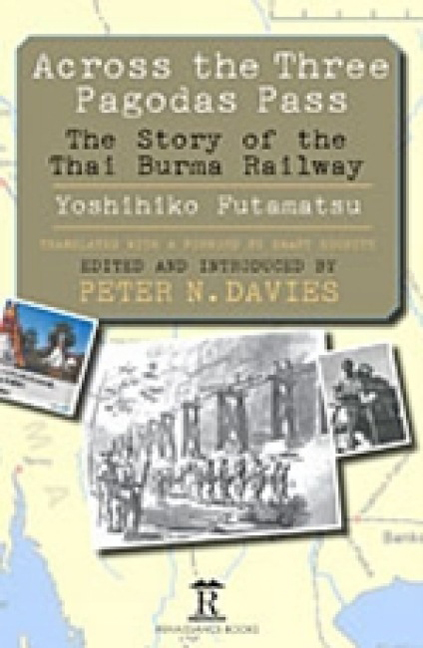Book contents
- Frontmatter
- Dedication
- Contents
- Acknowledgements
- Foreword
- Introduction
- Across the Three Pagodas Pass
- Translator’s Acknowledgements
- Preface
- Chapter 1 Departure for the Front
- Chapter 2 In Indo-China
- Chapter 3 Opening of Hostilities
- Chapter 4 The River Krian
- Chapter 5 The Malayan Campaign
- Chapter 6 The Fall of Singapore
- Chapter 7 Surrender
- Chapter 8 Shōnan: Light of the South
- Chapter 9 The Thai-Burma Railway
- Chapter 10 Preparing Construction
- Chapter 11 Banpong
- Chapter 12 Prisoners-of-War
- Chapter 13 Constructing the Railway
- Chapter 14 Thailand
- Chapter 15 The River Kwae Noi
- Chapter 16 The Mae Khlaung Bridge
- Chapter 17 Kanchanaburi
- Chapter 18 The Jungle
- Chapter 19 From Bangkok to Singapore
- Chapter 20 Rush Construction
- Chapter 21 The Base at Wanyai
- Chapter 22 The Labour Force
- Chapter 23 Survey Unit
- Chapter 24 Test Run
- Chapter 25 Bridge-Building and Shifting Earth
- Chapter 26 The Rainy Season: The Monsoon
- Chapter 27 Kinsaiyok
- Chapter 28 Diseases and Epidemics
- Chapter 29 Cattle Drive
- Chapter 30 Living in the Jungle
- Chapter 31 Soon to the Three Pagodas Pass
- Chapter 32 Towards the Setting Sun
- Chapter 33 Opening to Traffic
- Chapter 34 The Bombing
- Chapter 35 End of the War
- Chapter 36 Internment
- Chapter 37 Repatriation
- Footnote
- Postscript
- End Notes
- Glossary
- Bibliography
- Index
Chapter 30 - Living in the Jungle
Published online by Cambridge University Press: 13 May 2022
- Frontmatter
- Dedication
- Contents
- Acknowledgements
- Foreword
- Introduction
- Across the Three Pagodas Pass
- Translator’s Acknowledgements
- Preface
- Chapter 1 Departure for the Front
- Chapter 2 In Indo-China
- Chapter 3 Opening of Hostilities
- Chapter 4 The River Krian
- Chapter 5 The Malayan Campaign
- Chapter 6 The Fall of Singapore
- Chapter 7 Surrender
- Chapter 8 Shōnan: Light of the South
- Chapter 9 The Thai-Burma Railway
- Chapter 10 Preparing Construction
- Chapter 11 Banpong
- Chapter 12 Prisoners-of-War
- Chapter 13 Constructing the Railway
- Chapter 14 Thailand
- Chapter 15 The River Kwae Noi
- Chapter 16 The Mae Khlaung Bridge
- Chapter 17 Kanchanaburi
- Chapter 18 The Jungle
- Chapter 19 From Bangkok to Singapore
- Chapter 20 Rush Construction
- Chapter 21 The Base at Wanyai
- Chapter 22 The Labour Force
- Chapter 23 Survey Unit
- Chapter 24 Test Run
- Chapter 25 Bridge-Building and Shifting Earth
- Chapter 26 The Rainy Season: The Monsoon
- Chapter 27 Kinsaiyok
- Chapter 28 Diseases and Epidemics
- Chapter 29 Cattle Drive
- Chapter 30 Living in the Jungle
- Chapter 31 Soon to the Three Pagodas Pass
- Chapter 32 Towards the Setting Sun
- Chapter 33 Opening to Traffic
- Chapter 34 The Bombing
- Chapter 35 End of the War
- Chapter 36 Internment
- Chapter 37 Repatriation
- Footnote
- Postscript
- End Notes
- Glossary
- Bibliography
- Index
Summary
WATER
In the hot season you welcome cool water. Throughout the year there is no clear distinction between the four seasons in the various countries in the South but it is always hot and for various reasons water is important and precious. There are many encumbrances in the way, both physical and psychological, to prevent one getting used to heat. Cold water goes a long way to alleviate discomfort and drinking, bathing, rinsing clothes are several ways of using it. On occasions when one finds there is little or no water it is a serious matter. Men can't live without it, and life in the jungle without the blessing of water is incredibly difficult. In our life within the secluded boundaries of Thailand and Burma there was so much rain and abundant water-courses but the water did not always serve a useful purpose. The brimming waters of the River Kwae Noi were fearfully muddy at times and could not be used for various purposes. Water-courses in the jungle were dirtied by rotted vegetation, animal excrement and so on and could not, therefore, be drunk. It was impossible to dig wells to get at underground water. In particular there were times when bacteria abounded in water causing terrible contagious diseases, and it was, therefore, essential to keep water clean and sterilized.
People who had to live for some reason in the jungle invariably collected rainwater and used that. Even rainwater could become bacterial but they used their wits and kept it pure. In the earthen pots in which they collected rainwater there were mosquito-larvae but these local inhabitants drank water unconcernedly with the mosquito-larvae in it. That larvae bred in it showed it was pure. When offered water with no larvae in it we were quite apprehensive and did not feel like drinking it.
Into the Kwae Noi fed mountain streams and along them any people living there soiled the water with their sewage. This did not prevent them from using it for bathing and washing clothes but it was quite unsuitable for drinking. The upcountry people's life-style and that of our boatmen was to drink rainwater and they were invariably equipped with earthen pots to collect it. They did not drink river water.
- Type
- Chapter
- Information
- Across the Three Pagodas PassThe Story of the Thai-Burma Railway, pp. 147 - 153Publisher: Amsterdam University PressPrint publication year: 2013



